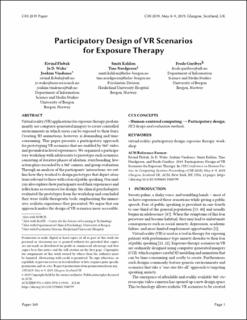Participatory Design of VR Scenarios for Exposure Therapy
Chapter
Permanent lenke
https://hdl.handle.net/11250/2652916Utgivelsesdato
2019Metadata
Vis full innførselSamlinger
Originalversjon
https://doi.org/10.1145/3290605.3300799Sammendrag
Virtual reality (VR) applications for exposure therapy predominantly use computer-generated imagery to create controlled environments in which users can be exposed to their fears. Creating 3D animations, however, is demanding and time-consuming. This paper presents a participatory approach for prototyping VR scenarios that are enabled by 360° video and grounded in lived experiences. We organized a participatory workshop with adolescents to prototype such scenarios, consisting of iterative phases of ideation, storyboarding, live-action plays recorded by a 360° camera, and group evaluation. Through an analysis of the participants’ interactions, we outline how they worked to design prototypes that depict situations relevant to those with a fear of public speaking. Our analysis also explores how participants used their experiences and reflections as resources for design. Six clinical psychologists evaluated the prototypes from the workshop and concluded they were viable therapeutic tools, emphasizing the immersive, realistic experience they presented. We argue that our approach makes the design of VR scenarios more accessible. Participatory Design of VR Scenarios for Exposure Therapy
